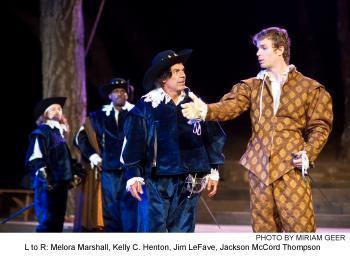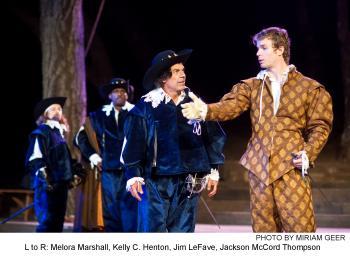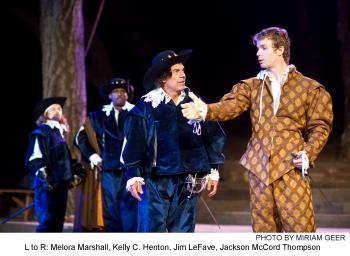TOPANGA, Calif.—Grab your musket (or your wallet) and join The Three Musketeers, a play with witty dialogue, sharp twists, multilayered characters, and a surprisingly modern and relevant plot. The 49-member repertory cast of the outdoor Theatricum Botanicum features a diverse group of up-and-comers as well as veterans of all ages performing their roles in this adapted classic to a tee.
The Three Musketeers follows youthful and virile d’Artagnan, who sets out from his farmland homestead toward Paris with a dream to join the famed royal guard known as the Musketeers. His shortcut to gain entry into the elite group is a handwritten note from his father signed for their captain.
Unfortunately for d’Artagnan, he loses the note in a rough encounter with the cardinal’s best man. Without this note, yet still set on his path to become a Musketeer, d’Artagnan must now prove his worth as a warrior, a lover, and a man.
All of the actors stand out in their own unique ways, but Melora Marshall, who plays the Musketeer named Aramis, nailed her role. Her portrayal of a royal guard sworn to uphold his martial duty, in conflict with biblical teachings learned in a prior life, encapsulate the inner and external struggle of the time.
In one particular moment, for example, during the Siege of La Rochelle, the Musketeers are led into temporary service of the Catholic cardinal, who uses force to eliminate a village of another faith. Should Aramis follow his biblical teachings, uphold his duty to the king of France, or follow the cardinal? Can he be responsible to everyone, including himself?
Aramis’s internal conflict is not even the focal point of the moment, but we cannot help but wonder what the people of the time must have felt amidst such suffering. And in other scenes, it is impossible not to laugh alongside Aramis as he bounces between his on-again and off-again relationship with God.
The Three Musketeers follows youthful and virile d’Artagnan, who sets out from his farmland homestead toward Paris with a dream to join the famed royal guard known as the Musketeers. His shortcut to gain entry into the elite group is a handwritten note from his father signed for their captain.
Unfortunately for d’Artagnan, he loses the note in a rough encounter with the cardinal’s best man. Without this note, yet still set on his path to become a Musketeer, d’Artagnan must now prove his worth as a warrior, a lover, and a man.
All of the actors stand out in their own unique ways, but Melora Marshall, who plays the Musketeer named Aramis, nailed her role. Her portrayal of a royal guard sworn to uphold his martial duty, in conflict with biblical teachings learned in a prior life, encapsulate the inner and external struggle of the time.
In one particular moment, for example, during the Siege of La Rochelle, the Musketeers are led into temporary service of the Catholic cardinal, who uses force to eliminate a village of another faith. Should Aramis follow his biblical teachings, uphold his duty to the king of France, or follow the cardinal? Can he be responsible to everyone, including himself?
Aramis’s internal conflict is not even the focal point of the moment, but we cannot help but wonder what the people of the time must have felt amidst such suffering. And in other scenes, it is impossible not to laugh alongside Aramis as he bounces between his on-again and off-again relationship with God.







